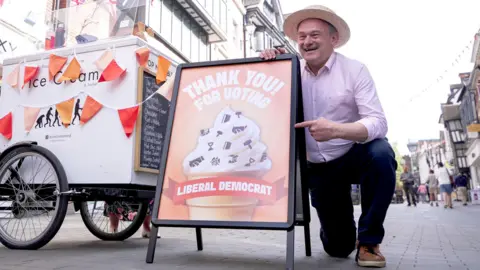Lib Dems take councils after local election gains
 PA Media
PA MediaThe Liberal Democrats have taken control of Oxfordshire, Cambridgeshire and Shropshire County Councils, after taking dozens of seats from the Conservatives across England, and pushing them into third place.
The Lib Dems have won more than 160 new seats, almost entirely from the Conservatives, with 370 councillors elected on Thursday.
They are also the largest party on Devon, Gloucestershire and Wiltshire County Councils and could run the local authorities either through a coalition or minority leadership.
Lib Dem Leader Sir Ed Davey said the local elections had led to a "fantastic set of results" for his party.
Sir Ed said: "For the first time ever we have overtaken the Conservatives in local elections and that's put us on track to overtake the Conservatives at the next general election.
"The Conservatives are now history, but we've got to do far more. The Labour Party has failed in government and it's been shown to fail at these elections too."
The Lib Dems are the only party other than Reform UK to take control of a council in this year's local elections, which saw support for Labour and the Conservatives collapse.
But the Lib Dems missed out on winning any of the mayoral races up for grabs, coming in second to Reform in Hull and East Yorkshire, despite running Hull City Council for the last three years.
While the votes were still being counted, Sir Ed told broadcasters the results were "exceeding my expectations".
He claimed the Lib Dems have taken the title of "party of Middle England" from the Conservatives - their stated aim at the start of the local election - after voters had "chosen our community politics over the Conservative Party's neglect and disdain".
Elections on Thursday were held in a total of 23 councils in England – mostly in rural and suburban areas where the Tories have traditionally been strong – as well as for six mayors.
This is a smaller set of local elections than normal after the government announced polls would be postponed in nine areas, where councils are being re-organised.
